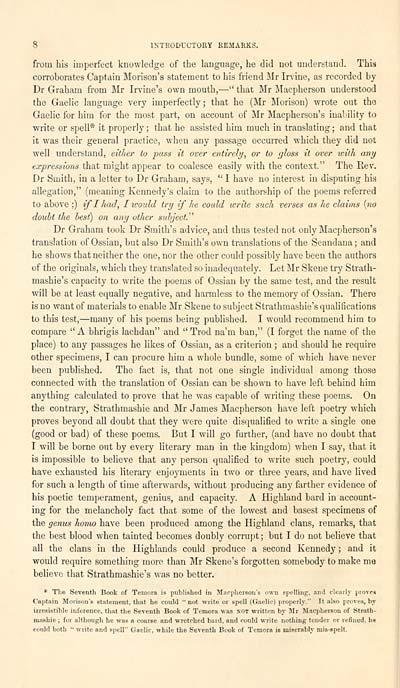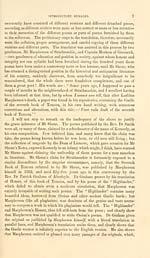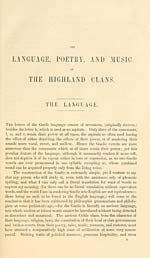Download files
Complete book:
Individual page:
Thumbnail gallery: Grid view | List view

8 INTRODUCTORY REMARKS.
from bis iiiipeifl-ct knowledge of the language, he did not understand. This
corroborates Captain Morison's statement to his friend Mr Irvine, as recorded by
Dr Graham from Mr Irvine's own mouth, — " that Mr ilacpherson understood
the Gaelic language very imperfectly; that he (Mr Morison) wrote out the
Gaelic for him for the most part, on account of Mr Macpherson's inability to
write or spell* it properly ; that he assisted him much in translating ; and that
it was their general practice, when any passage occurred which they did not
well understand, either to pass it over entirely, or to gloss it over xoith any
expressions that might appear to coalesce easily with the contest." The Rev.
Dr Smith, in a letter to Dr Graham, says, " I have no interest in disputing his
allegation," (meaning Kennedy's claim to the authorship of the poems referred
to above ;) if I had, I would try if he could lorite such verses as he claims {no
doubt the best) on any other subject."
Dr Graham took Dr Smith's advice, and thus tested not only Macpherson's
translation of Ossian, but also Dr Smith's own translations of the Seandana ; and
he shows that neither the one, nor the other could possibly have been the authors
of the originals, which they translated so inadequately. Let Mr Skene try Strath-
mashie's capacity to write the poems of Ossian by the same test, and the result
will be at least equally negative, and harmless to the memory of Ossian. There
is no want of materials to enable Mr Skene to subject Strathmashie's qualifications
to this test, — many of his poems being published. I would recommend him to
compare "A bhrigis lachdan" and " Trod na'm ban," (I forget the name of the
place) to any passages he likes of Ossian, as a criterion ; and should he require
other specimens, I can procure him a whole bundle, some of which have never
been published. The fact is, that not one single individual among those
connected with the translation of Ossian can be shown to have left behind him
anything calculated to prove that he was capable of writing these poems. On
the contrary, Strathmashie and Mr James Macpherson have left poetry which
proves beyond all doubt that they were quite disqualified to write a single one
(good or bad) of these poems. But I will go further, (and have no doubt that
I will be borne out by every literary man in the kingdom) when I say, that it
is impossible to believe that any person qualified to write such poetry, could
have exhausted his literary enjoyments in two or three years, and have lived
for such a length of time afterwards, without producing any farther evidence of
his poetic temperament, genius, and capacity. A Highland bard in account-
ing for the melancholy fact that some of the lowest and basest specimens of
the genus homo have been produced among the Highland clans, remarks, that
the best blood when tainted becomes doubly corrupt ; but I do not believe that
all the clans in the Highlands could produce a second Kennedy ; and it
would require something more than Mr Skene's forgotten somebody to make me
believe that Strathmashie's was no better.
* The Seventh Book of Temora is published iu MacpheiBou's own spoiling, and cltmly [iinvi-a
Captain Morison's statement, that he could " not write or spell (Gaelic) properly." It also proves, by
irresistible inference, that the Seventh Book of Temora was NOT written by Mr Macplierson of Strath-
mashie ; for although he was a coarse and wretched bard, and could write nothing tendci or refined, he
foidd both '■ write and spell" Gaelic, while the Seventh Book of Temora is miecrnbly mis-spelt.
from bis iiiipeifl-ct knowledge of the language, he did not understand. This
corroborates Captain Morison's statement to his friend Mr Irvine, as recorded by
Dr Graham from Mr Irvine's own mouth, — " that Mr ilacpherson understood
the Gaelic language very imperfectly; that he (Mr Morison) wrote out the
Gaelic for him for the most part, on account of Mr Macpherson's inability to
write or spell* it properly ; that he assisted him much in translating ; and that
it was their general practice, when any passage occurred which they did not
well understand, either to pass it over entirely, or to gloss it over xoith any
expressions that might appear to coalesce easily with the contest." The Rev.
Dr Smith, in a letter to Dr Graham, says, " I have no interest in disputing his
allegation," (meaning Kennedy's claim to the authorship of the poems referred
to above ;) if I had, I would try if he could lorite such verses as he claims {no
doubt the best) on any other subject."
Dr Graham took Dr Smith's advice, and thus tested not only Macpherson's
translation of Ossian, but also Dr Smith's own translations of the Seandana ; and
he shows that neither the one, nor the other could possibly have been the authors
of the originals, which they translated so inadequately. Let Mr Skene try Strath-
mashie's capacity to write the poems of Ossian by the same test, and the result
will be at least equally negative, and harmless to the memory of Ossian. There
is no want of materials to enable Mr Skene to subject Strathmashie's qualifications
to this test, — many of his poems being published. I would recommend him to
compare "A bhrigis lachdan" and " Trod na'm ban," (I forget the name of the
place) to any passages he likes of Ossian, as a criterion ; and should he require
other specimens, I can procure him a whole bundle, some of which have never
been published. The fact is, that not one single individual among those
connected with the translation of Ossian can be shown to have left behind him
anything calculated to prove that he was capable of writing these poems. On
the contrary, Strathmashie and Mr James Macpherson have left poetry which
proves beyond all doubt that they were quite disqualified to write a single one
(good or bad) of these poems. But I will go further, (and have no doubt that
I will be borne out by every literary man in the kingdom) when I say, that it
is impossible to believe that any person qualified to write such poetry, could
have exhausted his literary enjoyments in two or three years, and have lived
for such a length of time afterwards, without producing any farther evidence of
his poetic temperament, genius, and capacity. A Highland bard in account-
ing for the melancholy fact that some of the lowest and basest specimens of
the genus homo have been produced among the Highland clans, remarks, that
the best blood when tainted becomes doubly corrupt ; but I do not believe that
all the clans in the Highlands could produce a second Kennedy ; and it
would require something more than Mr Skene's forgotten somebody to make me
believe that Strathmashie's was no better.
* The Seventh Book of Temora is published iu MacpheiBou's own spoiling, and cltmly [iinvi-a
Captain Morison's statement, that he could " not write or spell (Gaelic) properly." It also proves, by
irresistible inference, that the Seventh Book of Temora was NOT written by Mr Macplierson of Strath-
mashie ; for although he was a coarse and wretched bard, and could write nothing tendci or refined, he
foidd both '■ write and spell" Gaelic, while the Seventh Book of Temora is miecrnbly mis-spelt.
Set display mode to: Large image | Transcription
Images and transcriptions on this page, including medium image downloads, may be used under the Creative Commons Attribution 4.0 International Licence unless otherwise stated. ![]()
| Early Gaelic Book Collections > Blair Collection > Treatise on the language, poetry, and music of the Highland clans > (20) |
|---|
| Permanent URL | https://digital.nls.uk/76236623 |
|---|
| Description | A selection of books from a collection of more than 500 titles, mostly on religious and literary topics. Also includes some material dealing with other Celtic languages and societies. Collection created towards the end of the 19th century by Lady Evelyn Stewart Murray. |
|---|
| Description | Selected items from five 'Special and Named Printed Collections'. Includes books in Gaelic and other Celtic languages, works about the Gaels, their languages, literature, culture and history. |
|---|

